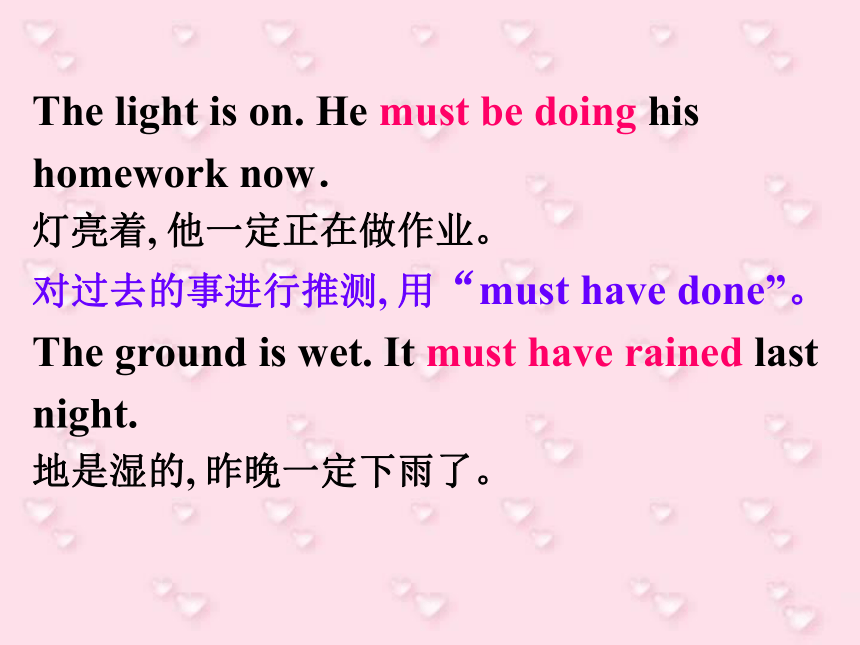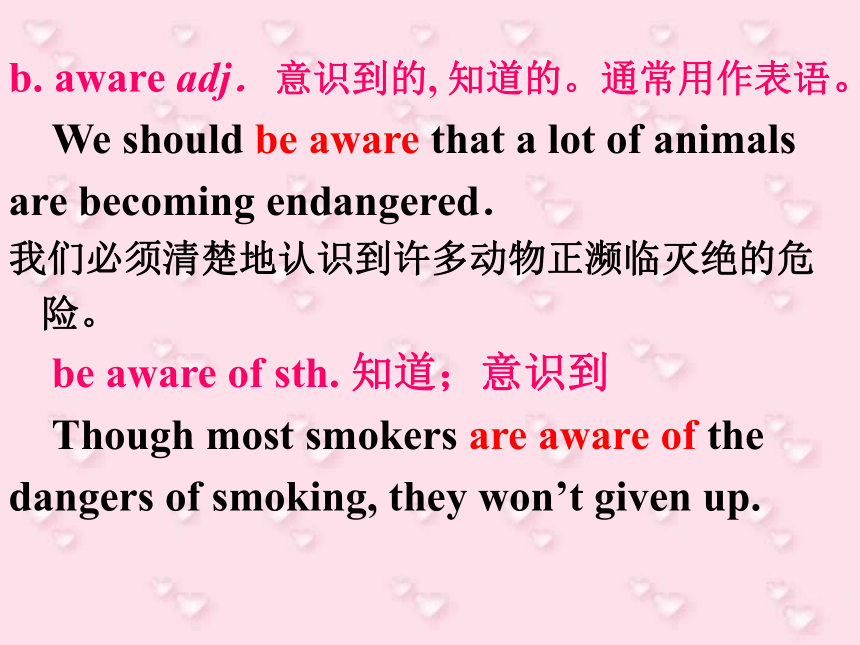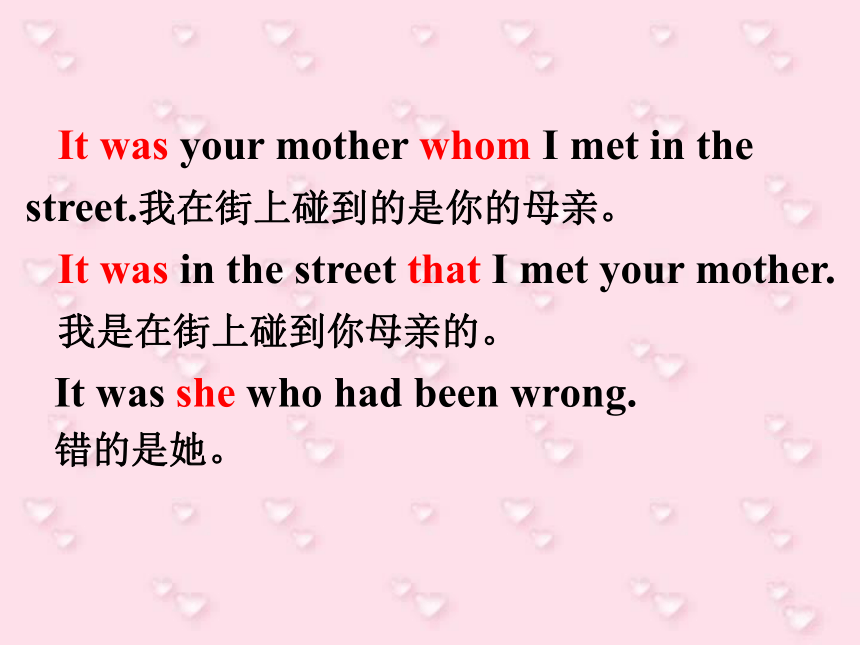Unit 5 Meeting your ancestors Language points 课件(28张PPT)
文档属性
| 名称 | Unit 5 Meeting your ancestors Language points 课件(28张PPT) |  | |
| 格式 | zip | ||
| 文件大小 | 347.0KB | ||
| 资源类型 | 教案 | ||
| 版本资源 | 人教版(新课程标准) | ||
| 科目 | 英语 | ||
| 更新时间 | 2019-12-15 16:00:13 | ||
图片预览









文档简介
(共28张PPT)
1. alternative n.替换物
an alternative to sth. 代替某事物的办法/方案 There are some alternatives to our plan.
有几种方案可以代替我们的计划。
have no alternative but to do sth.
除做某事外别无选择
He had no alternative but to go there alone.
他别无选择, 只好一个人去那儿。
Explanation
2. You must be aware that it’s here that we’ve found evidence of some of the earliest people who lived in this part of the world. 想必你们知道, 正是在这儿我们找到了居住在世界这个部分最早人类的证据。
a. You must be aware that…主句后接由强调句和定语从句组成的宾语从句。
must是作为情态动词表示肯定推测, 译作“一 定, 肯定”。只用于肯定推测。 对现在或将来事实推测,用 “must do”。
You must be hungry after a long walk.
走了很长的路, 你一定很饿。
对正发生或进行的事进行推测, 用“must be
doing”。
The light is on. He must be doing his
homework now.
灯亮着, 他一定正在做作业。
对过去的事进行推测, 用“must have done”。
The ground is wet. It must have rained last
night.
地是湿的, 昨晚一定下雨了。
此时, 应注意反意疑问句的构成。如果句
中有表示过去的时间状语, 反意疑问句“didn’t+
主语”; 如果句中无表示过去的时间状语, 反义
疑问句用 “haven’t/hasn’t+主语”。
He must have arrived here last night, ________?
他一定昨晚就来这儿了, 不是吗?
He must have arrived here, _________?
他一定来这儿了, 不是吗?
didn’t he
hasn’t he
b. aware adj.意识到的, 知道的。通常用作表语。
We should be aware that a lot of animals
are becoming endangered.
我们必须清楚地认识到许多动物正濒临灭绝的危险。
be aware of sth. 知道;意识到
Though most smokers are aware of the
dangers of smoking, they won’t given up.
c. it’s here that we’ve… 是强调句,其基本句式是It is (was)+被强调部分+that (who) +句子其他部分。此结构强调的成分仅限于主语,宾语和状语。
It was your mother whom I met in the
street.我在街上碰到的是你的母亲。
It was in the street that I met your mother.
我是在街上碰到你母亲的。
It was she who had been wrong.
错的是她。
d. “Who lived in this part of the world”是定语从句修饰先行词 people。people在定语从句作主语, 故用关系代词who来引导定语从句。
3. I’m sorry to interrupt you but how could they live here?
很抱歉打扰你, 我想问问他们是怎么在这里生活的?
句型“I’m sorry...but...”是口语中委婉的表达, “but”表示语义上的转折。
— Are you free this weekend?
— I’m sorry, but l have lots of work
to do.
— 周末有空吗?
— 对不起, 我有大量的事要做。
2) 打岔; 插嘴
It is rude to interrupt.
“Don’t interrupt,” he said.
1) 阻断, 中断
His studies were interrupted by the war.
Don’t interrupt him, for he hasn’t
finished yet.
4. We have found human and animal bones in those caves higher up the hill as well as tools and ornaments. 我们在山的比较高的洞穴里发现了动物和人类的骨头以及工具和装饰品。
as well as
1) conj. as well as 可以用来连接两个相同的成分, 如名词, 形容词, 动词, 介词, 通常不位于句首。意为“不但......而且”。
2) prep. 相当于besides, in addition to, 意为“除......之外”, 后面通常接名词或动词。
As well as eating five course meals, they drank two bottles of wine.
She sings as well as playing the piano.
Helen as well as I is eager to see the performance.
5. So we think it is reasonable to assume
they lived in these caves, regardless of the
cold. 因此我们有理由认为他们不顾寒冷住在
这些洞穴里。
regardless of the cold 不顾寒冷
assume vt. 假定:设想
The scientists assume that there are no
animals on the moon.
科学家设想月球上没有动物。
6. regardless of prep.
1) without being affected by different situations,
problems, etc. 不管; 不顾
He climbed the building, regardless of the
danger.
不管有多危险, 他还是爬上了大厦。
2) in spite of
We will persevere regardless of past failures.
尽管以前我们失败过, 但仍要坚持下去。
cut up 切碎,使受伤,使丧气
cut 引导的短语
cut in 插嘴,打断
cut off 使……隔绝
cut up 切碎,使受伤,使丧气
All of the passengers on the bus were badly
______ in the accident.
A. cut out B. cut through
C. cut up D. cut back
He was in hospital for six months. He felt as if
he was _______ from the outside world.
A. cut out B. cut off
C. cut up D. cut through
8. That would have kept them warm,
cooked the food and scared wild animals
away as well.
他们用这火取暖、做饭, 还能用火吓跑野兽。
1) would 表示猜测, 译为“想必……”、“肯定会……”。
2) keep them warm为keep+宾语+宾语补足语的结构意为 “使......处于某种状态(情况)”。用作宾语补足语常见的词有现在分词、过去分词、形容词、副词以及介词短语。
He kept me waiting for half an hour.
Keep your mouth shut and your eyes open.
9. We have been excavating layers of ash
almost six metres thick, which suggests that
they might have kept the fire burning all
winter.
我们一直在挖掘一层层的积灰, 几乎有六米厚,
这说明他们可能整个冬季都在烧火。
a. “have been excavating”是现在完成进行
时, 表示从过去开始一直延续到现在, 强调动作
的继续。
I have been looking for my lost book for three days, but I still haven’t found it.
我找我丢的书已经三天了, 但仍没找到。
11. Yes, indeed, as the botanical analyses
have been specifically showing us, all the
fields around here used to be part of a
large shallow lake.
确实, 正如植物学分析具体显示给我们的那
样, 附近所有的土地都曾是大型浅湖的一部分。
a. as引导的非限制性定语从句常译作“正如 —— 那样”。
As the proverb goes, “The enemy in
disguise is just like the wolf in sheep’s
clothing.”正如谚语所说的那样, 伪装的敌人
就像是披着羊皮的狼。
b. part 前无 adj. 修饰时为不可数名词, 前面不
用冠词;其前有adj. 修饰时为可数名词,要用
冠词。
The blues has been part of African
American culture since then and it is still
an important part of American culture.
自从那以后布鲁斯就已经是非美文化的一部
分, 而且现在仍是美国文化的重要部分。
1. alternative n.替换物
an alternative to sth. 代替某事物的办法/方案 There are some alternatives to our plan.
有几种方案可以代替我们的计划。
have no alternative but to do sth.
除做某事外别无选择
He had no alternative but to go there alone.
他别无选择, 只好一个人去那儿。
Explanation
2. You must be aware that it’s here that we’ve found evidence of some of the earliest people who lived in this part of the world. 想必你们知道, 正是在这儿我们找到了居住在世界这个部分最早人类的证据。
a. You must be aware that…主句后接由强调句和定语从句组成的宾语从句。
must是作为情态动词表示肯定推测, 译作“一 定, 肯定”。只用于肯定推测。 对现在或将来事实推测,用 “must do”。
You must be hungry after a long walk.
走了很长的路, 你一定很饿。
对正发生或进行的事进行推测, 用“must be
doing”。
The light is on. He must be doing his
homework now.
灯亮着, 他一定正在做作业。
对过去的事进行推测, 用“must have done”。
The ground is wet. It must have rained last
night.
地是湿的, 昨晚一定下雨了。
此时, 应注意反意疑问句的构成。如果句
中有表示过去的时间状语, 反意疑问句“didn’t+
主语”; 如果句中无表示过去的时间状语, 反义
疑问句用 “haven’t/hasn’t+主语”。
He must have arrived here last night, ________?
他一定昨晚就来这儿了, 不是吗?
He must have arrived here, _________?
他一定来这儿了, 不是吗?
didn’t he
hasn’t he
b. aware adj.意识到的, 知道的。通常用作表语。
We should be aware that a lot of animals
are becoming endangered.
我们必须清楚地认识到许多动物正濒临灭绝的危险。
be aware of sth. 知道;意识到
Though most smokers are aware of the
dangers of smoking, they won’t given up.
c. it’s here that we’ve… 是强调句,其基本句式是It is (was)+被强调部分+that (who) +句子其他部分。此结构强调的成分仅限于主语,宾语和状语。
It was your mother whom I met in the
street.我在街上碰到的是你的母亲。
It was in the street that I met your mother.
我是在街上碰到你母亲的。
It was she who had been wrong.
错的是她。
d. “Who lived in this part of the world”是定语从句修饰先行词 people。people在定语从句作主语, 故用关系代词who来引导定语从句。
3. I’m sorry to interrupt you but how could they live here?
很抱歉打扰你, 我想问问他们是怎么在这里生活的?
句型“I’m sorry...but...”是口语中委婉的表达, “but”表示语义上的转折。
— Are you free this weekend?
— I’m sorry, but l have lots of work
to do.
— 周末有空吗?
— 对不起, 我有大量的事要做。
2) 打岔; 插嘴
It is rude to interrupt.
“Don’t interrupt,” he said.
1) 阻断, 中断
His studies were interrupted by the war.
Don’t interrupt him, for he hasn’t
finished yet.
4. We have found human and animal bones in those caves higher up the hill as well as tools and ornaments. 我们在山的比较高的洞穴里发现了动物和人类的骨头以及工具和装饰品。
as well as
1) conj. as well as 可以用来连接两个相同的成分, 如名词, 形容词, 动词, 介词, 通常不位于句首。意为“不但......而且”。
2) prep. 相当于besides, in addition to, 意为“除......之外”, 后面通常接名词或动词。
As well as eating five course meals, they drank two bottles of wine.
She sings as well as playing the piano.
Helen as well as I is eager to see the performance.
5. So we think it is reasonable to assume
they lived in these caves, regardless of the
cold. 因此我们有理由认为他们不顾寒冷住在
这些洞穴里。
regardless of the cold 不顾寒冷
assume vt. 假定:设想
The scientists assume that there are no
animals on the moon.
科学家设想月球上没有动物。
6. regardless of prep.
1) without being affected by different situations,
problems, etc. 不管; 不顾
He climbed the building, regardless of the
danger.
不管有多危险, 他还是爬上了大厦。
2) in spite of
We will persevere regardless of past failures.
尽管以前我们失败过, 但仍要坚持下去。
cut up 切碎,使受伤,使丧气
cut 引导的短语
cut in 插嘴,打断
cut off 使……隔绝
cut up 切碎,使受伤,使丧气
All of the passengers on the bus were badly
______ in the accident.
A. cut out B. cut through
C. cut up D. cut back
He was in hospital for six months. He felt as if
he was _______ from the outside world.
A. cut out B. cut off
C. cut up D. cut through
8. That would have kept them warm,
cooked the food and scared wild animals
away as well.
他们用这火取暖、做饭, 还能用火吓跑野兽。
1) would 表示猜测, 译为“想必……”、“肯定会……”。
2) keep them warm为keep+宾语+宾语补足语的结构意为 “使......处于某种状态(情况)”。用作宾语补足语常见的词有现在分词、过去分词、形容词、副词以及介词短语。
He kept me waiting for half an hour.
Keep your mouth shut and your eyes open.
9. We have been excavating layers of ash
almost six metres thick, which suggests that
they might have kept the fire burning all
winter.
我们一直在挖掘一层层的积灰, 几乎有六米厚,
这说明他们可能整个冬季都在烧火。
a. “have been excavating”是现在完成进行
时, 表示从过去开始一直延续到现在, 强调动作
的继续。
I have been looking for my lost book for three days, but I still haven’t found it.
我找我丢的书已经三天了, 但仍没找到。
11. Yes, indeed, as the botanical analyses
have been specifically showing us, all the
fields around here used to be part of a
large shallow lake.
确实, 正如植物学分析具体显示给我们的那
样, 附近所有的土地都曾是大型浅湖的一部分。
a. as引导的非限制性定语从句常译作“正如 —— 那样”。
As the proverb goes, “The enemy in
disguise is just like the wolf in sheep’s
clothing.”正如谚语所说的那样, 伪装的敌人
就像是披着羊皮的狼。
b. part 前无 adj. 修饰时为不可数名词, 前面不
用冠词;其前有adj. 修饰时为可数名词,要用
冠词。
The blues has been part of African
American culture since then and it is still
an important part of American culture.
自从那以后布鲁斯就已经是非美文化的一部
分, 而且现在仍是美国文化的重要部分。
